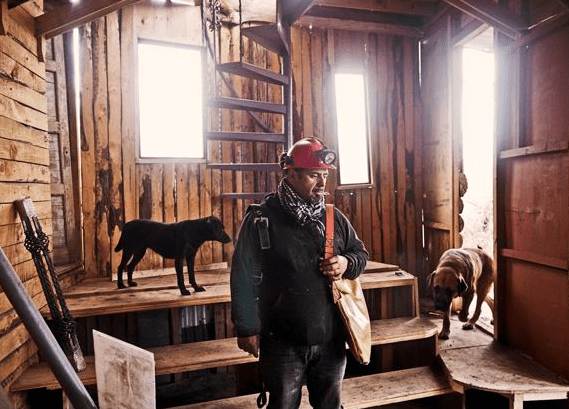 “The only thing I do is live,” said forty-year old Mario Sepulveda. He was one of the 33 men trapped for 69 days in Chile’s San Jose Mine in the Atacama Desert back in 2010.
“The only thing I do is live,” said forty-year old Mario Sepulveda. He was one of the 33 men trapped for 69 days in Chile’s San Jose Mine in the Atacama Desert back in 2010.
From birth when his mother died, Sepulveda’s life had been marked by violence and struggle; he fought to stay alive. His nickname was Perri, short for a diminutive form of perro, which means dog. He had rescued two strays. “I have the heart of a dog,” he said, referring to his loyalty. But, he added, speaking to anyone who might hurt him, “I’ll bite you.”
Few of us will face a test like Sepulveda and his fellow miners did. In the July 7 & 14, 2014 issue of The New Yorker, author Hector Tobar profiled several of the men. Sepulveda possessed a rather unique character, foulmouthed, manic and moody. Yet he was the one who rose to lead during the crisis. “The only thing we can do is to be strong, super-disciplined, and united,” he told his fellow miners.
Sepulveda doled out rationed food like communion. Spooning a teaspoon of tuna and water into 33 plastic cups then handing out two cookies to each miner, Sepulveda said, “Enjoy your meal. This is delicious stuff. Make it last.” Eventually, the tuna and water ran out. The miners drank water tainted with motor oil and ate cookies only every other day. On average, they each lost twenty pounds.
After a few days, Sepulveda became agitated and angry. “I feel powerless,” he shouted and fell to his knees. “Those who want to pray, come and join me.” He called upon one of his colleagues, known to be a Christian, to lead them in prayer.
From that day forward, the men gathered to pray before eating – 33 miners of different faiths united. At first, they prayed in penitence and desperation. Later prayer meetings included self-examination and apologies for transgressions. Some men expressed gratitude, hope and love.
Dying fear never left them. Communication with the surface had been knocked out by the collapse. The mountain continued to rumble. The first drill bypassed the refuge location. Would the searchers give up?
When a second drill bit broke through 18 days after the collapse, the men cried, “God exists.” They hit the drill shift, “like little kids hitting a pinata,” one of the miners said. They attached messages to the drill bit and spray painted it. When the crew topside raised the bit, they knew: all 33 miners were alive.
Within hours, small tubes of glucose were lowered to the men. Protein drinks and fresh water followed. With communication restored, news of their celebrity status reached the miners. Living fear returned in the form of greed and vanity, betrayal and disappointment.
The miners received offers for money, interviews, appearances and endorsements. Almost immediately, they started to bicker. Sepulveda’s unity disintegrated. “Have pity on us,” he prayed alone in the bowels of the mountain, “and make us as we were before.” He felt the presence of something evil. “I was fighting the Devil,” he told his fellow miners when he returned to the refuge location. He was covered with mud.
It took until mid-October to complete the rescue shaft and shuttle all 33 men out via an escape capsule. In the months that followed, the miners were treated like rock stars. Many went to Disney World and took other trips. Gift and award ceremonies continued for over a year. Mario Sepulveda was not immune to the media frenzy, but used his status to help build houses for people left homeless by the 2010 earthquake and tsunami in Talcahuano.
In Bible Study at church yesterday, we spoke of the Wisdom in Proverbs: Fear and Trust in the Lord. What does fear mean? Temporal fear is emotional, negative and passive, as in, “I am afraid; I feel betrayed.” Spiritual fear is external, positive and active. “I fear the Lord: I revere, trust and serve.”
Apparently, Mario Sepulveda’s living fear resides in the spirit of Wisdom.



0 Comments